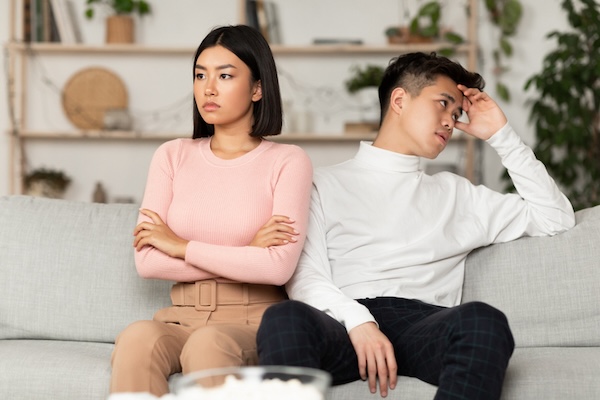Am I The Problem in Our Relationship? How To Know.
By Dr. Margaret PaulFebruary 05, 2024
Discover how to know which one of you is the major cause of your relationship problems.
 When I work with couples or with individuals who are in a relationship, often each partner is convinced it’s mostly the other person’s behavior that is causing the problems. Certainly, it’s always easier to see what others are doing than what we are doing in our relationships.
When I work with couples or with individuals who are in a relationship, often each partner is convinced it’s mostly the other person’s behavior that is causing the problems. Certainly, it’s always easier to see what others are doing than what we are doing in our relationships.
This is the problem that Kailee is having in her relationship, and she asked me this que
stion:
“I grew up in a very emotionally abusive home, and I am currently having problems in my marriage. How can I tell if I am genuinely having problems with my husband’s behavior, or if I am reacting to triggers from my past?”
What I would say to Kailee is that it’s both.
We all bring our baggage with us from our family of origin, and it’s in our primary, committed relationship that everything that is unhealed gets triggered. So, there is no doubt that Kailee is reacting to triggers from her emotionally abusive past.
On the other hand, we attract partners from our common levels of woundedness and health, which means that whomever we attract has about the same amount of baggage. Our level of woundedness is the level to which we self-abandon, and our level of health is our level of self-love and taking responsibility for our feelings.
Coming from an emotionally abusive home, Kailee absorbed many of the unloving ways her parents treated her and is now likely treating herself in many of the same ways, as well as in the ways they treated themselves. Her husband is no doubt doing the same.
Kailee asks if she is genuinely having problems with her husband’s behavior and the answer is likely y
es. She asks if she is reacting to triggers from the past and again, the answer is likely yes.
What To Do?
Instead of trying to figure out who has the problem, Kailee needs to stop focusing at all on her husband’s behavior and put her focus only on her own feelings and behavior. She needs to begin to become aware of her own reactions to her husband’s behavior.
She needs to ask herself questions such as:
“If my husband is angry, blaming, withdrawn or resistant, how do I react? Do I get angry, blaming, compliant, withdrawn, or resistant?
“What happens between us when I’m reactive to his unloving behavior?”
“Are there painful feelings I’m avoiding when I get reactive to his behavior? What are the feelings I’m avoiding with my own unloving behavior: loneliness, heartbreak, helplessness concerning him?”
“What is getting triggered from the past?”
“Am I reacting in the same way my parents reacted?”
“In what ways is my husband similar to my parents?”
“Am I treating myself the ways my parents treated me, or treated themselves?”
Once Kailee gets a clear picture of how she and her husband are treating themselves and each other, then she can ask her inner wise self, or an older, wiser part of herself, or her higher guidance:
“What would be loving to me when he is being unloving to me? What behavior would be in my highest good?”
If Kailee genuinely wants to learn how to take loving care of herself in the face of her husband’s unloving behavior, answers will start to pop into her mind.
Practice, Practice, Practice!
It takes practice to keep our eyes on ourselves, notice our own behavior, and begin to tune into what it looks like to take loving care of ourselves. With practice, Kailee will change her participation in the relationship system with her husband, and this will change the entire system. As she becomes kinder to herself, she will naturally become kinder to her husband, and this might lead to improvements in their relationship. If it gets better – great! If it gets worse, then Kailee knows that this is likely not the right relationship for her.
Kailee can’t know this until she is focused on her own healing work. Even if just one person in a relationship changes their end of the relationship system, the relationship can greatly improve.
Heal your relationships with Dr. Margaret’s 30-Day online video relationship course: Wildly, Deeply, Joyously in Love.
 Send this article to a friend
Send this article to a friend  Print this article
Print this article  Bookmarked 0 time(s)
Bookmarked 0 time(s)
Comments
| Author | Comment | Date |
|---|---|---|
| Join the Inner Bonding Community to add your comment to articles and see the comments of others... | ||

Daily Inspiration
If someone's behavior makes your stomach tight, attend. Your stomach may be reacting to an energy that is unloving. It is only when you attend to your inner feelings that you can take loving action in your own behalf.
By Dr. Margaret Paul

 Share with Del.icio.us
Share with Del.icio.us Share with Digg
Share with Digg







